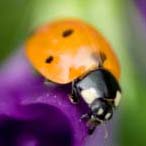You Are Invited to an "Insect Collection" Night
by Beth Monroe, Public Relations & Marketing Director, Lewis Ginter Botanical Garden
 Thursday, September 17
Thursday, September 17
8 – 11 p.m.
Lewis Ginter Botanical Garden
Ever stop to think about the millions of insects surrounding us each day? Probably not — because so many are unseen.
That will not be the case on Thursday, September 17. On that evening, Lewis Ginter Botanical Garden will be an “insect collection” site. An entomology class led by Virginia Commonwealth University Associate Professor Dr. Karen Kester will be at the Garden examining and collecting insects, and you are invited to come and observe. [Learn why being able to identify bugs can help make you a better gardener.]
There is no charge to attend and all ages are welcome.
How does it work?
Starting around dusk, the class will set up two observation sites. (These are tentatively scheduled to be on the Rose Garden lawn and behind the Conservatory.) The students will hang large white sheets vertically – like a screen. A light source (black lights and mercury vapor lights) will be used to attract the insects. As the insects “perch” on the sheet, the class will examine them and take collections. Attendees will also be able to “get up close and personal” to see the insects.
Interested?
- If you wish to participate, you can arrive anytime between 8 – 11 p.m. Best viewing should be around 9 p.m.
- Come to the Visitor Center atrium and someone will direct you to the insect collection sites.
- Bring a flashlight and please dress appropriately (ie – sturdy shoes!)
- You may want to bring a magnifying glass.
The insect collection is weather-dependent. September 17 was chosen because it is a new moon phase and the greater contrast between the dark night and the lights makes collection more successful.
Garden staff Tom Brinda, Randee Humphrey and Jay Forehand (also a student in Dr. Kester’s class) will be on-hand.
Why is this important?
One of Dr. Kester’s research interests is the use of insects and other arthropods as sentinels for detecting harmful agents in the environment. A lot of insects and a great diversity of insects indicate a healthy environment – and we expect to see that on September 17.
Grab a flashlight and come join us!